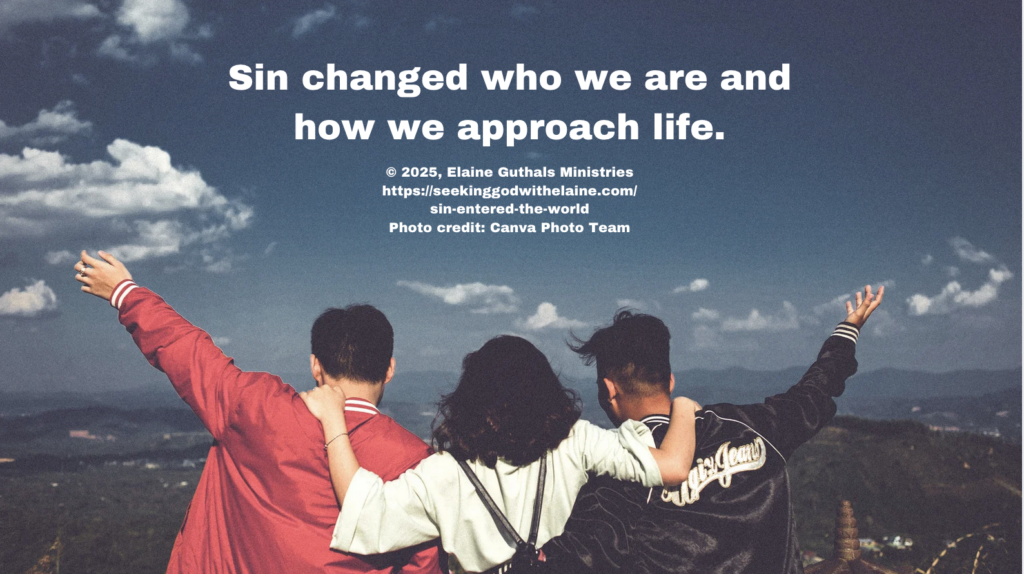What were the first couple thinking? This devotional reading looks at the man and the woman committing the original sin.
Nuggets
- Satan got the woman to reevaluate the fruit.
- The woman made a choice to sin.
- The woman gave the man the fruit to eat, but she didn’t force him to eat.

We look at the man and the woman in the Garden of Eden and think they are set for life. But then they go and blow it.
How could they have messed up the one thing asked of them?
Program note: of course, fitting everything in these last couple of devotions was challenging. Some is going to have to wait until the next devotion.
Let's Put It into Context #1
To read devotions in the Creating Everything theme, click the button below.
Devotions in the Celebrating Creation’s Story series
Let's Put It into Context #2
Sin is a churchy word. What exactly is it?
Sin is not believing that Jesus is our Savior to save us from our actions that disobey God and break one of His reasonable, holy, and righteous laws and commandments, goes against a purpose He has for us, or follows Satan’s promptings.
Sin is a disease. It is a moral disease that brings many devastating consequences, which we will discuss later.
While we are responsible for our own sins, Gilfillan reminded us that it is a hereditary disease. Sin entered into the world when the couple sinned. All of their descendants have been cursed because of them.
Resource
Satan trying to convince us to sin is called temptation. Temptation is a suggestion in our mind that would lead us to sin rather than following God’s Will. It is also that period of time between conception and execution of doing what is sinful.
Exell, Wardlaw, and Ogle showed us the ways how Satan tempts us.
- Satan tries to catch us by surprise.
- Satan tries to convince us that restrictions on our lives are too impulsive, unequal, unkind or unnecessary – leaning in on his concern for us.
- Satan tries to convince us that God’s character should not be respected, lowering our gratitude towards Him.
- Satan tries to cast doubt on God and our faith in Him.
- Satan tries to coach our disobedience out of our unbelief.
- Satan tries to convince us that we should have that which we lust after.
- Satan will flat out lie to us about consequences of disobedience.
Resources
There is an order to sin that Candlish gave us.
- We have to doubt that God is good.
- We have to disbelieve that He wants our relationships restored.
- We have to reject His holiness.
Resource
We know Satan is — in most cases — the one offering the temptation to us.
- “Then Satan entered into Judas Iscariot, who was one of the twelve disciples” (Lk. 22: 3 NLT).
- “Then Peter said, ‘Ananias, why have you let Satan fill your heart? You lied to the Holy Spirit, and you kept some of the money for yourself’” (Acts 5: 3 NLT).
- “Then Jesus, full of the Holy Spirit, returned from the Jordan River. He was led by the Spirit in the wilderness, where he was tempted by the devil for forty days” (Lk. 4: 1-2 NLT).
Jesus was the only one to stand firm against Satan.
Oh, no. Don’t think that you are above sin. Each and every one of us is going to have to deal with our sin.
- “For this is how God loved the world: He gave his one and only Son, so that everyone who believes in him will not perish but have eternal life. God sent his Son into the world not to judge the world, but to save the world through him. There is no judgment against anyone who believes in him. But anyone who does not believe in him has already been judged for not believing in God’s one and only Son” (Jn. 3: 16-18 NLT).
- “And anyone who believes in God’s Son has eternal life. Anyone who doesn’t obey the Son will never experience eternal life but remains under God’s angry judgment” (Jn. 3: 36 NLT).
- “I have written this to you who believe in the name of the Son of God, so that you may know you have eternal life” (I Jn. 5: 13 NLT).
- “But every man is tempted, when he is drawn away of his own lust, and enticed.” (Jas. 1: 14 KJV).
- “For everyone has sinned; we all fall short of God’s glorious standard” (Rom. 3: 23 NLT).
The Woman Was Convinced
“The woman was convinced. She saw that the tree was beautiful and its fruit looked delicious, and she wanted the wisdom it would give her. So she took some of the fruit and ate it. Then she gave some to her husband, who was with her, and he ate it, too” (Gen. 3: 6 NLT)
Satan got the woman to reevaluate the fruit.
On the surface, the sin doesn’t look like it is much of a sin at all. (We’re going to get more into that in the connections of the next devotion.) What is the big deal about eating a piece of fruit?
The fruit was looking pretty darn tasty. The woman had to be by the tree of knowledge of good and evil to see it (Gen. 3: 6).
Even better, it had the side benefit of providing the knowledge of good and evil.
That brings up the lust of the eyes. “For all that is in the world — the desires of the flesh and the desires of the eyes and pride of life — is not from the Father but is from the world” (I Jn. 2: 16 ESV).
What does lust of the eyes mean? When we have lust, that means we desire something. No, it isn’t limited to sexual desire.
There are a lot more things we see with our eyes other than someone’s smoking body. We see cars, houses, gadgets, land, fame, fortune, beauty, bright shiny stuff, good smelly stuff — a lot of things.
How does the NLT put it? “For the world offers only a craving for physical pleasure, a craving for everything we see, and pride in our achievements and possessions. These are not from the Father, but are from this world” (I Jn. 2: 16 NLT).
Yeah, everything we see sums it up. No, those all aren’t necessarily bad things — any more than wisdom itself is a bad thing.
What makes something a bad thing is when it comes from the world’s lustful values and Satan’s temptations instead of God’s character and His Will.

What makes it a prop in the temptation was that the woman’s focus became fixed on the fruit. Part of me wants to say fixated, but part of me doesn’t want to go that far.
The woman was seeing how nice and shiny it was and how tasty it would be. She couldn’t stop thinking about all she would gain from biting. The knowledge she would gain kicked her pride up a notch or two.
Maybe the woman didn’t understand the terminology. Yeah, it was in the name, but did Eve really understand what evil — aka sin — was? If all she had ever known was goodness, how would she be able to visualize evil? Sometimes, it is difficult to understand what the opposite of something is.
I can just hear worldview people screaming that the woman couldn’t have made an informed decision if that was the case. To their way of thinking, everything needs to be spelled out exactly and understood.
That isn’t always what God wants. He wants obedience for the unseen and not understood.
- “Faith shows the reality of what we hope for; it is the evidence of things we cannot see” (Heb. 11: 1 NLT).
- “‘My thoughts are nothing like your thoughts,’ says the Lord. ‘And my ways are far beyond anything you could imagine. For just as the heavens are higher than the earth, so my ways are higher than your way and my thoughts higher than your thoughts’” (Isa. 55: 8-9 NLT).
What God is saying to us is more important than how circumstances look and what experience tells us.

Part of the problem was the woman wanted the wisdom. Oh, yes. God wants us to have wisdom — the correct wisdom the correct way.
- “For the Lord grants wisdom. From his mouth come knowledge and understanding” (Prov. 2: 6 NLT).
- “If you need wisdom, ask our generous God, and he will give it to you. He will not rebuke you for asking” (Jas. 1: 5 NLT).
- “Sensible people keep their eyes glued on wisdom, but a fool’s eyes wander to the ends of the earth” (Prov. 17: 24 NLT).
- “Intelligent people are always ready to learn. Their ears are open for knowledge” (Prov. 18: 15 NLT).
- “Joyful is the person who finds wisdom, the one who gains understanding. For wisdom is more profitable than silver, and her wages are better than gold” (Prov. 3: 13-14 NLT).
- “But the wisdom from above is first of all pure. It is also peace loving, gentle at all times, and willing to yield to others. It is full of mercy and the fruit of good deeds. It shows no favoritism and is always sincere.” (Jas. 3: 17 NLT).
- “God has united you with Christ Jesus. For our benefit God made him to be wisdom itself. Christ made us right with God; he made us pure and holy, and he freed us from sin” (1 Cor. 1: 30 NLT).
- “Get all the advice and instruction you can, so you will be wise the rest of your life” (Prov. 19: 20 NLT).
- “Pride leads to disgrace, but with humility comes wisdom” (Prov. 11: 2 NLT).
- “So be careful how you live. Don’t live like fools, but like those who are wise. Make the most of every opportunity in these evil days” (Eph. 5: 15-16 NLT).
No, the ends do not justify the means when the means employ disobedience.

The woman didn’t have to know the full reason why God didn’t want her to eat the fruit. She only had to know that He didn’t.
She Ate It
The woman made a choice to sin.
The woman disobeyed God’s direct command. She bit.
Once the woman took the bite and nothing really happened, it made it look like Satan was telling the truth and God was lying. She didn’t fall down dead. She kept right on breathing.
But then, there are times when there is something going on spiritually while we are expecting only the physical. There were things happening to her spiritual condition.
The woman earned the consequences of sin. The consequences of sin are spiritual death and separation from God.
The couple’s sin (when the man gets into the picture) opened the door for the consequences of their actions. It may not have seemed like a big deal, but it sure was.
Humankind have never been the same since the couple sinned.

Many see that there are several — seemingly unlimited — consequences of sin. I see it a different way.
I see God mainly focused on our spiritual conditions. Because of that, the consequences of sin would address those conditions.
That is why I limit the consequences of sin to spiritual death and separation from God. Anything else — physical death, disease, poverty, etc. — are the results of sin.
Some may say spiritual death is separation from God — and yes, it is to an extent.
Strong identified what spiritual death is. While we are still made in God’s image, our moral character is different from God’s. We are slaves to sin.
- “Jesus replied, ‘I tell you the truth, everyone who sins is a slave of sin’” (Jn. 8: 34 NLT).
- “So Christ has truly set us free. Now make sure that you stay free, and don’t get tied up again in slavery to the law.” (Gal. 5: 1 NLT).
- “We know that our old sinful selves were crucified with Christ so that sin might lose its power in our lives. We are no longer slaves to sin” (Rom. 6: 6 NLT).
- “They promise freedom, but they themselves are slaves of sin and corruption. For you are a slave to whatever controls you” (II Pet. 2: 19 NLT).
- “Don’t you realize that you become the slave of whatever you choose to obey? You can be a slave to sin, which leads to death, or you can choose to obey God, which leads to righteous living” (Rom. 6: 16 NLT).
Resource
That spiritual death leads to spiritual separation. Spiritual separation has several different what we might call levels. We’ll find as we read farther in this chapter that the couple were banished from the Garden of Eden. That ended humankind’s “physical” interactions with God.
Most importantly, this spiritual separation ultimately will be an eternal condition. Those who are spiritually dead on the Day of the Lord will be eternally separated from God. That leads to eternal death.
Yeah, it’s kind of a vicious circle.
But we can deal with our spiritual death. God designed the Plan of Salvation so that we can be regenerated to spiritual life. That severs the spiritual separation and restores our relationship with God.
There are results of sin that aren’t just the bad things it brings. It has changed humans, also. We lost our original righteousness.
We went as a race from not sinning at all to sinning multiple times in a variety of ways. Sin changed who we are and how we approach life.

I’m not sure if the next is a result or a reason. Our gratification is restricted in size, amount, or extent. They can pull us into further sin.
Hannah summed it up this way.
- We lost the special gifts God had given us.
- Our nature became corrupted.
- We were guilty in God’s eyes.
Resource
Okay, something just popped into my head.
- Where was the woman at? In the Garden of Eden.
- What was the Garden? Heaven on earth.
- What are we supposed to do in Heaven? Worship.
The first sin occurred in church. God’s Temple is holy, but our free will switch is not switched off when we traverse its threshold.
If they, who had a face-to-face relationship with the Creator, couldn’t not sin, how are we, who do not see Him face to face, withstand temptation so we don’t sin?
She Gave Some to Her Husband, and He Ate It
The woman gave the man the fruit to eat, but she didn’t force him to eat.
The woman must have thought the fruit tasted okay — and since she didn’t physically die — so she gave it to the man to eat. And he ate it.
The woman, in a way, gets a bad rap because she gave the fruit to eat to her husband. We are told not to be stumbling blocks. “So let’s stop condemning each other. Decide instead to live in such a way that you will not cause another believer to stumble and fall” (Rom. 14: 13 NLT). She will be judged on that.
Ooo, baby. Satan loves to get one person to lead another person away from God. He supposedly did that to those who turned into demons. Why wouldn’t he try that with a husband and wife?
Remember in the last devotion, we talked about the man maybe could have talked the woman out of eating the fruit. Good thing we didn’t hold our breath.
There is no indication that the man raised any objections. But neither does it say that he even questioned her decision or her offering. It looks like he just chowed down.
The man made his own decision. He didn’t have to eat it. He chose to do so.
The man is ultimately responsible for his own sin.
Isn’t it sad that Satan has so many options in his arsenal to use on the unsuspecting?
White had a great observation. He wrote, “Thus he makes use of the wise and learned to persuade, of men of power and authority to command, and to compel men to evil practices, of beautiful women to allure to lust, of great men to countenance, and of men of strength and power to exercise violence and oppression. And this he doth upon a double reason.”
Resource
Satan also likes to use those who are already cunning and deceptive. But then, he also uses those who are subtle.
Also used are people who have authority over us. But it all comes down to our own decision.
We don’t make someone else sin. Satan doesn’t even make us sin. (Sorry, the devil made me do it isn’t a valid argument.)
Sin is an inner force, an inner instinct.

And so, both died a spiritual death.
Making the Connections
How long did it take the woman to sin? The way it reads is one question and one rebuttal.
That didn’t take long!
Don’t we think that Garden of Eden citizens should have put up a bigger resistance? Doesn’t sound like it happens in this case.
Wardlaw reminded us that this was a test. How do we use tests today?
- We read the textbook and listen to the instructor’s lecture.
- We compare any new information with previously learned information to see what, if anything, is more accurate than what we currently know.
- We apply that information to get the right answer in the examination.
Resource
How does the saying go? Teachers are silent during the test-taking time.
It is the same way with God. He uses the Holy Spirit to instruct us and grow us, but then He has to see how we will perform. We have to discern what God is telling us in His Word to daily evaluate circumstances in order to obey God.
Will we remain obedient to Him, or will we fall back into sin?
They had one test. Yes, they had all but unlimited access to the fruit in the Garden of Eden, but their grade was based on one pass or fail test.
And they failed.
How Do We Apply This?
- Open our eyes and our hearts to God’s Truth.
- Don’t be ignorant and apathetic of God’s Word.
- Using wisdom, anticipate evil before it is too late so we can prevent it.
- Understand that all of Satan’s interactions with us are designed to weaken our relationships with God.
- Don’t think we are above sin because we feel ourselves steak adults.
- Recognize the chaos within us caused by sin.
- Accept the fact that our sin unleashes new dangers in the form of a damaged conscience with loss of love and confidence to replace them with unease and disgrace.
Resources
Father God. We are so sorry that we as a race could not completely obey You. Thank You for offering us a second chance — and chance after chance. We are sorry that we cannot completely obey You even after we accept Your salvation. We long for the day when we will no longer sin. Amen.
What do you think?
Leave me a comment below (about this or anything else) or head over to my Facebook group for some interactive discussion.
If you don’t understand something and would like further clarification, please contact me.
If you have not signed up for the email providing the link to the devotions and the newsletter, do so below.
If God has used this devotion to speak with you, consider sharing it on social media.